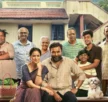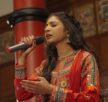Mahakavi Bharathi’s Birthday
- 20th July 2010
- POST IN :UNCATEGORISED
Subramanya Bharathi aka Mahakavi Bharathi (the laudatory epithet Maha Kavi meaning Great Poet in many Indian languages), he is celebrated as one of India’s greatest poets.
Bharathi was prolific and adept in both the prose and poetry forms. His compositions helped rally the masses to support the Indian independence movement in South India. Bharathi lived during an eventful period of Indian history, his contemporaries including prominent leaders of the Indian independence movement such as Mahatma Gandhi, Bal Gangadhar Tilak, Sri Aurobindo and V.V.S.Aiyar.
Bharathi was devoted towards his mother tongue Tamil language, which he considered as the sweetest of all the languages known to him. In one of his poems he wrote, ‘Of all the languages I know, I have not heard a sweeter language than Tamil’. He was fluent in many languages including Telugu, Bengali, Hindi, Sanskrit, Kutchi, French and English and frequently translated works from other languages into Tamil. He had a voracious appetite for learning ancient and contemporary Tamil literature especially ancient poems.
Bharathi was a pioneer in introducing a new style of Tamil poetry. Until then the poems had to follow the strict syntactic rules set down by the ancient Tamil grammatical treatise TolkÄppiyam. Bharathi broke this syntactic bonds and created a prose-poetic style known as the puthukkavithai (modern poems).
Bharathi composed Carnatic music kritis in Tamil on love, devotion, etc. He set his songs to music and could sang them in a variety of ragas. In Bharata Deviyin Thiru Dasangam he used ten different ragas. His patriotic songs emphasized nationalism, unity of India, equality of man and the greatness of the Tamil language, set to folk tunes. He sang these himself at various political meetings.
With the vast majority of his songs being in Tamil, Bharathi also composed two songs entirely in Sanskrit. In an article Sangeeta Vishayam (Issues in Music), Bharathiyar rebuked musicians for singing songs of the Trinity, Patnam Subramania Iyer and others without knowing the meaning because the songs were in Sanskrit or Telugu. He stated that without knowing the meaning, singers were unable to sing with proper expression.
Bharathi set tunes for a number of his songs, however not all of them have been recovered. Some of the songs of Bharathi that are currently very popular in the Carnatic music concert circuit include: Theeratha Vilaiyattu Pillai, Chinnanchiru Kiliye (tuned by him in Raga Bhairavi, but popularised in Ragamalika), Suttum Vizhi, Thikku Theriyaatha, Senthamizh Nadenum and Paarukkule Nalla Naadu.
Bharathi’s health was badly affected by the imprisonments and by 1920, when a General Amnesty Order finally removed restrictions on his movements, Bharathi was already struggling. He was struck by an elephant at Parthasarathy temple, Thiruvallikeni, Chennai, whom he used to feed regularly. Although he survived the incident, a few months later his health deteriorated and he died on September 11, 1921. Though Bharathi was a people’s poet there were only fourteen people to attend his funeral.
Source: Wikipedia
Here, we at Thamarai share a portion from the award winning Rajiv Menon movie, Kandukondain Kandukondain (I have seen), in which the main protagonist, played by Aishwarya Rai, is hugely passionate about Bharathi’s poetry and progressive views. His work has influenced each and every Tamil poet and reached far beyond just the confines of Tamil Nadu. This song is a popular version of his popular Suttum Vizhi song features in this clip.
Like many uncelebrated geniuses whose lives are celebrated posthumously, we at Thamarai reminisce the great works of the great Tamil poet, on this, his birthday. RIP
- Previous Post
M.I.A’s new album under-way






















